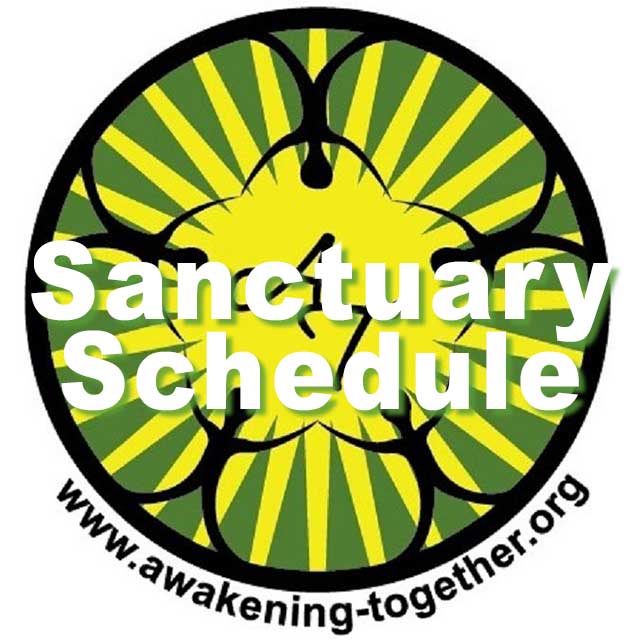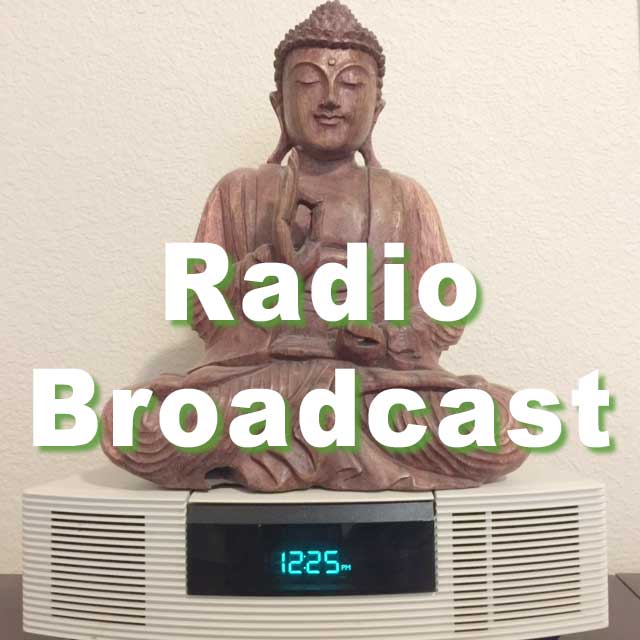It seems to me, that what immediately occurs upon entering a river, is that you get wet. And I am here using “getting wet” as a metaphor for spontaneous contemplative experience, that one gets wet.
Now what’s so interesting about getting wet upon entering the river, is that it doesn’t matter whether it is the very first time you enter the river or whether you have entered it hundreds and hundreds of times, you get just as wet. A person doesn’t enter the river the first time and come out just a little dampish and saying, “I’ll keep working on it, I don’t think I know how to get wet yet.” Likewise, a person who has entered the river hundreds of times doesn’t come out dry and say, “I ran out of turns, I can’t get wet anymore. The river does not grant itself to me. I’ve used up my River-Entering tickets.” Now it is most likely, and certainly true, that the one who has entered the river many times, may have a profound realization, understanding, and experience of all that being wet is. But nonetheless, from the very first time one enters the river, one is wet.It also doesn’t matter whether one enters the river after living along its banks since birth or whether one had to travel hundreds of miles to get to the river, one gets just as wet either way. It isn’t as if the one who travelled hundreds of miles gets more wet as a reward for the hardship of the journey. Whether one lived on its banks, or whether one travelled far to get there, in entering the river, one is wet.It also doesn’t matter whether one enters the river after great and careful and determined deliberation to do so, or whether one fell in off the back of a pier, one gets just as wet. The one who arrived at the moment of entering the river by virtue of a courageous process of working up the courage to do so is not rewarded by getting more wet than the one who fell in.Likewise, it doesn’t matter whether one enters the river in broad daylight or whether one enters the river in the secrecy of the darkness of night, (a kind of closet river-enterer, that kind of slips in while nobody’s watching). One gets just as wet either way. Whether one enters in broad daylight where all can see or whether one enters secretly in a darkness where nobody sees, one is wet.It also doesn’t matter whether one enters all alone or enters with thousands and thousands of people, one gets just as wet. It isn’t as if you get more wet if you enter all by yourself and you have the wetness of the river all to yourself, whereas if you have to share it with all these thousands of people you don’t get as wet. You get just as wet.It also doesn’t matter what you believe, as if people of a certain belief system would get more wet than those of another belief system, or more wet than those who hold to no belief system. It also doesn’t matter whether you be sinner or saint, one gets just as wet either way. We might call this the graciousness of the river, that she accepts all who come to her. Jesus says that just as the sun shines upon the good and the bad, so does God’s love shine upon all of us. It is this graciousness, this oceanic benevolence, this non-discriminatory, overflowing generosity that grants itself perfectly as it grants itself.This is not to say that it is risk-free. The ego-self is fragile. It cannot tolerate too much reality at once. We can find ourselves drowning in a depth of beneolence. We can find ourselves immersed in a generosity that we can’t tolerate, that we cannot bring ourself to bear, and in finding ourselves unable to escape from it, we’re beside ourselves. Therefore, to find an experienced river-enterer, one who offers guidance to us, in the process of entering the river….to be a seeker of the contemplative way within one’s own tradition is to be one whose fidelity to river-entering gives witness to what is most true within the tradition.
Timothy Conway – Healing Abusive Models of God
Finding the Living God of Love, Light, Truth, Beauty, Goodness, Kindness, Fullness and Bliss!
In sharing spiritual awareness with so many wonderful people over the last 35+ years since my own lucky, Grace-filled gift of suddenly one day realizing in my 16th year that we are literally made out of God’s Love and Light and Peace and Joy (an entirely unexpected event that instantly changed my life forever), I have time and time again noticed that a remarkably large segment of our population has a very negative sense of this powerful little word “God.”
In my many talks and classes over the last 25 years I have actually had some people ask me (usually in private) if it would be possible for me not to use this three-letter G-word, because “I really don’t like it,” or “it gives me the creeps.”
Early on, I realized that far, far too many people have beenreligiously abused in the name of “God,” and my use of the word God, interspersed with frequent reference to Spirit, Awareness, the Absolute, Divine Reality, Brahman, Tao, Buddha-nature, the Self, and so forth, is a red flag for these abused people. Indeed, the apparently innocuous word “God” actually triggers stress and emotional pain for them—in severe cases, a full-blown syndrome of PTSD or Post-Traumatic-Stress-Disorder.
This brings up the entire issue of communication itself: what we mean by a word is not necessarily what other people think or feel it means when they hear it.
The plain fact is that, in the name of “God,” multitudes of people have been disturbed, frightened and in more serious ways abused by well-meaning—let alone really abusive—parents, grandparents, older siblings, aunts, uncles, teachers, ministers, priests, nuns, televangelists, rabbis, mullahs, et al.
It can start innocently enough: a little child’s goldfish dies and s/he is told, “God took your little fish up to heaven.” When another pet or a grandparent or friend dies and the child is similarly told, “God ended their life here and took them away to be with Him up there in heaven,” the child begins to get the disturbing impression that “God” is the invisible bogeyman who suddenly and arbitrarily cheats us out of the precious company of our beloved kin and friends.
When terrible things happen locally or on the world-stage, a child eventually hears from religious-minded persons that this is “God’s will.” In the impressionable minds of young persons, “God’s will” usually soon takes on the quality of being an unpredictable, frightening, fickle force, a big “Somebody” or “Something” that feels adversarial, oppositional and destructive, rather than being Someone infinitely near and dear. With such conditioning, it’s not evident that God and I are teammates on the same side. On some level, the youngster sooner or later begins to think: “God’s interests and my interests are not aligned.”
It gets much more complicated and perverse: at a certain age, the young person in our western monotheistic culture starts hearing and being psychologically conditioned by the notion that God is watching you, meticulously and obsessively examining everything you do and think, “writing down black marks in His big heavenly book concerning your sins and demerits.” For this “God” is quite intent on eventually judging you to be a good person or a bad person, a person destined (even predestined!!) to go either to heaven or to hell after you die and pass into your “eternal reward.”
Some 20-30 million Americans alone have evidently bought into—and, alas, are now subjecting their hapless children to—the really barbaric and quite aberrant “rapture theology” of rightwing, rigid forms of evangelical Christianity. Based on that horrible mistake appended to the New Testament—the dementedly dualistic, even diabolical Book of Revelation or Apocalypse—rapture theology holds that our evidently not-so-“loving” but all-knowing, almighty, and quite vindictive Lord has created every soul already knowing that likely well over 80% or even 90% of them (for various reasons foreseen by God) won’t exclusively accept Jesus the Christ “as their personal Lord and Savior” in the prescribed way. And therefore all these souls not partisan enough to join in God’s exclusivist game are going to be damned to eternal hell.
No wonder that so many people reject their religious upbringing and God—and everything having to do with religion—and, from their felt-sense of emptiness, “act out” their deep disappointment, rage and/or ennui through sex, drugs and rock’n’roll partying. Or even worse forms of acting out.
I recall one night, as a little Catholic boy of about 9 years old, running downstairs from my bedroom into the arms of my loving parents who were watching TV in the family room. I was sobbing and crying, because there, in the darkness of my bedroom, rather than peacefully, contentedly falling asleep, I had been filled with horrific agitation, angst and fear over the not so unlikely prospect that one day I might commit a bad sin or two (or three, four or more!) and thereby be banished from God and heaven and all loved ones to burn in hell, forever and ever…. This thought was excruciating! Lying and squirming in my darkened bedroom, racked with emotional pain, I could tolerate only so much before in desperation I finally went running to my dear parents for some kind of relief. I don’t remember particularly what they said, but I think my caring mother responded to the effect that, if I had good intentions and tried my best, even if I failed, God and the saints (led by good ol’ all-forgiving Mother Mary) would still love me, save me from hell, and help me come into heaven. Whatever my mom and dad said, it sufficed to alleviate the existential fear so that I never had that overwhelming type of hellish “hell-dread” again.
Where exactly I had picked up such a disturbing notion of a wrathfully judging God and eternal hell in the first place, I don’t know. Perhaps it was from something on TV (e.g., one of those fire-and-brimstone preachers) that I might have heard while playing with my toy cars and trucks within earshot. Maybe it was something I heard in church or at school, though I was very fortunate to have been raised by the decidedly progressive Paulist priests in Westwood (West Los Angeles), and by the unexpectedly liberal Daughters of Mary and Joseph Catholic nuns who taught us at St. Paul the Apostle school right next-door to the church of the same name. Most of these nuns were recent arrivals from Ireland and one might expect them to be of the conservative type who beat disobedient children over the knuckles with their big wooden rulers. No—if anything, my buddies and I were much tougher on those darling nuns than they were on us, creating chronic disciplinary problems with our relentless joking, teasing and horsing around.
The bottom line for me is that I was very fortunate to be around people who lived their religion and spirituality in a relatively healthy manner. I don’t recall being subject to any “serial abuse” in the name of religion.
But listening to or reading about so many people over the decades who have experienced significant and even severe forms of religious abuse, threatened with eternal damnation by a judging, petty, punitive “God-the-father” critical parent run amok, I can easily see why many persons would like never ever to hear the word “God” again. A dear friend of mine, deeply spiritual in her own way, when reading through most of the books and articles in her collection has actually blackened out the word “God” with her marking-pen wherever she finds it. She just doesn’t like to see a word that, to her psyche from childhood, is a signifier loaded with pain.
Given that the term “God” can be so negatively-loaded for numerous people, at one point 20 years ago I briefly wondered if it might not be better to drop it altogether from my vocabulary. But in the next instant I realized that this would be a silly thing to do, forGod as a word and a notion is simply too widespread in our society and, for the majority of our population, still has an overall positive connotation and meaningful content.
Instead, over the years, as part of the multi-faceted “ministry” I’ve been graced and privileged to enjoy, in my conversations and classes I have opted to help heal participants of any negative connotations or content around this potent term God.
While in undergraduate study of psychology at UCSC and UCLA and then in graduate school at CIIS in San Francisco, I realized long ago how powerful the subconscious mind can be—and how easily the subconscious can be rendered full of “glitches” due to “bad programming.”
It is obvious that many, many people have been conditioned and programmed by an unwholesome, petty, threatening, punitive—in short, toxic notion of “God.” This unholy, bullying image of “God” sits in people’s subconscious mind, literally haunting anddisturbing them. Even atheists and agnostics who have long agoconsciously rejected and renounced the idea of God can still be affected subconsciously by an insidiously subtle, inner “God-program” deep within their psyche.
A disturbing, unsafe sense of God (or whatever you regard as the Source or Power behind our life and the manifestation of this universe) will almost invariably lead to feeling that our cosmic situation is disturbed and unsafe, and that we can’t trust the Source of the universe. How can we have faith in a Divine Being who, our subconscious mind intimates to us, is not faithful to our best interests and eternal well-being?
All such “bad religious programming” characterizing our deepest-rooted impression about the nature of God or the Universal Power or Fate is enervating. It is guaranteed to render us restless, fearful, unhappy, imbalanced human beings. We will feel “at odds” with life, the cosmos and its Source at the most basic level of our being.
Hence, we do well to investigate—through an inner psychological inventory—any unhealed, unwholesome, unholy notions of “God” floating around in our conscious, pre-conscious, or subconscious minds.
Furthermore, having uncovered such pseudo-God notions masquerading as the Real God within our hearts, we can inwardly, meditatively invoke the actual Infinite Divine Being (Absolute Spirit-Love-Light-Truth-Beauty-Goodness-Kindness-Fullness) to purely affirm this God-Self within every aspect of our being. In other words, we can let the Real God, the God before/beyond our dysfunctional human notions and projections about “God,” spontaneously blossom forth within our body-mind-soul-consciousness. We can let God, the authentic living God, be fully and truly God in us.
* * * * * * * * *
When I first began conducting these healing visualizations and “energetic attunements” concerning the idea and image or intuitive impression of God, I heard many testimonials on how this was so very helpful to people. Therefore, I began to include this type of healing session more and more with new and old groups of students.
Here, finally, I have written up this “God-clearing” exercise as something to explore whenever you wish to turn to it for inner Divine healing.
This exercise, I find, is very helpful for people not only of a devotional religious temperament but also for those who are involved in “nondual” or “mystical” spirituality and the path of formless, imageless self-inquiry into the real nature of the transpersonal Self. Such self-inquiry will not proceed very deeply if somewhere in the subconscious mind there is a lurking sense of arival power contaminating our being with toxic energy. To paraphrase and “heal” the old Biblical commandment: “I am the Lord your God-Self; you need not have any other ‘strange gods’ within you.”
Some of you may wish to record onto tape/CD a meditatively-soothing, reading of the following visualization, so that you can subsequently listen to it while in a more meditative state with eyes closed and body fully relaxed. Alternatively, you can have a gentle companion read this aloud to you from the computer screen while you sit nearby in a relaxed, inwardly focused state. And then you can both trade places—you read the text while your companion meditatively listens. (At some point in the not so distant future, I’ll try to upload a streaming-audio recording of the text for this exercise, so that you can listen to it by yourself as a guided healing meditation while sitting quietly and receptively.)
I call this experiential process: letting God be fully, truly God in your heart. Try it—you’ll like it!
* * * * * * * * * *
Meditation Exercise:
Healing Our Model of God
Letting God be fully, truly God in your heart
[Note: italicized words can be read with somewhat greater emphasis. Ellipses (…) indicate pauses for contemplative silence.]
* * * * * * * *
Alright. As we’re gathered here together, we can allow ourselves to become naturally and fully relaxed….
We can easily maintain a gentle, inward focus as, with each breath, rising and falling, breathing in and out, we allow ourselves tounwind and relax and open up more and more.
There’s no need to grasp or hold onto anything. We’re simplyallowing the breathing to happen and feeling the wonderful and interesting sensations and energies that arise and pass away, moment by moment… It’s so very easy to relax and let go and open up fully and completely….
Now: let us check to see or feel if there are any old, unneeded images or tensions in any part of us around the idea of “God.” When we hear the word “God,” is there any feeling of discomfort in any part of the heart or mind or body?…
If anything unpleasant arises, let us fully feel the sensation or the energy and then utterly let it go. Just like letting go the string on a helium balloon, we just let go any threatening images or toxic notions of God that might be cluttering our being, and they just fly away and disappear….
Completely letting go, we find ourselves feeling wonderfully clear and clean and fresh and new…. So much more present and vitaland alive….
Now: right here within our heart, emptied out of the old, unneeded images or feelings about the Divine One, we can allow the REAL GOD, the LIVING GOD of healing Love … and beautifully luminous Light… and clarifying Truth… and enchanting Beauty… and blissful Sweetness… and dazzling Goodness…—we can allow this glorious Divine One to affirm this Divine Love, Light and Truth, this Divine Beauty, Sweetness, and Goodness fully within us…. It feels so good to have this God of healing Love in us and around us.
Right now and right here we fully feel the wonderfully dear anddelightful Presence of the True God gently yet powerfully filling our heart to overflowing with all wonderful qualities and virtues… so that now we feel tremendously well and happy, majesticallypeaceful and content, and perfectly nurtured and loved. We feel filled up with so much power to love and serve and be helpful andcreative… God is expressing through us such a wonderful power, a blessed power that fills us up ever more completely so that we can receive and give so, so much…
Again: we can check to see if any aspect of our being, any part of our heart or corner of our mind is disturbed by any old falsemessages or unnecessary feelings about the human-projected “God”-idea lurking inside us….
And, again, we can this very instant allow the REAL GOD to powerfully and completely dissolve any such false notions about the Divine One, the Source or Power behind our life and world, so thathere and now the true God of pure, Self-shining Spirit and delightfully Divine Presence and Fullness and Goodness washes through and fills our being with only God….
…
“All is well, and all shall be well…” The true God of astonishingly beautiful LOVE and gloriously gorgeous LIGHT is radiantly shiningwithin every cell and fiber of our being, filling our body and mindand heart with so much wonderful healing and empoweringenergy….
…
Alright. You may slowly open your eyes …
… and see the One True God, Infinite, Vast and Formless,beautifully manifesting as everyone you see and meet!
© Copyright 2006 by Timothy Conway
www.Enlightened-Spirituality.org
Weekly Gathering, 12/15/13
Appreciating the Mystery
Phil Frisk, minister, shares about angels and other paranormal beings you may or may not believe in, and then he shifts our attention in an interesting and inspiring way.
His wife, Judy Frisk, reads “The Day We Saw the Angels” by Prof. S. Ralph Harlow.
Barbara Deurwaarder serves as room administrator.
Weekly Gathering, 12/8/13
What You Are Will Tell You of Itself
David Fishman, minister, helps us remember that “I don’t know” opens up the space within the mind that allows us to realize truth and know wisdom.
Suzanne Leeds reads from A Course in Miracles Workbook for Students, Lesson 47.
Barbara Deurwaarder serves as room administrator.
Weekly Gathering, 12/1/13
Respecting One Another’s Spiritual Intuition
Regina Dawn Akers, minister, talks about her thoughts regarding Charles Anderson of Endeavor Academy, more popularly known as “Master Teacher”.
Jacquelin Erwin reads “Listen, this world. Listen to this call” by Charles Anderson.
Barbara Deurwaarder serves as room admin.
Weekly Gathering, 11/24/2013
God Responds to the Energy of Gratitude
Phil Frisk, Ordained Awakening Together minister, offered a sermon on gratitude for the Thanksgiving season. Lao Tzu advised in his 46th verse, “Practice Gratitude and contentment every day”. Also shared, are several inspiring minister’s stories that inspire gratitude. Phil also offered great tips for continued health. Judy Frisk reads from “Journey Beyond Words” by Brent Haskell. The Gathering administrator was Barb Deurwaarder.
Weekly Gathering, 11/17/2013
Littleness versus Magnitude
Jay McCormick, licensed Awakening Together minister, invited everyone to let go of our ‘little’ world and accept the grandure of the truth of our expansive nature. Remember that every choice we make stems from who I think I am, and represents the value you put upon yourself. Teddy Poppe reads “Littleness versus Magnitude” from ACIM Chapter 15. The room Admin was Barb Deurwaarder.
Weekly Gathering, 11/10/13
Lyn Johnson, Licensed Minister gave a wonderful talk centered around A Course in Miracles Lesson 181 “I trust my brothers, who are one with me”. Teddy Poppe reads the lesson, and Jay McCormick is the administrator. Lyn reminds us of the refreshing awareness that every moment we start over again with our brother, knowing that no matter what happens the are ‘walking with you’ and there is no reason for fear.
Weekly Gathering, 11/3/2013
Time is NOW! Love is experienced in the Now!
Phil Frisk, minister, shares from his vast experience the simple joy of being in the moment, and realizing that even when you are ‘thinking about the past’ your doing so in the MOMENT Of NOW! Phil shares many simple and refreshing examples of this practice, and this talk is filled with great quotes and inspirational stories. Realize the truth that is now, and realize that you can never become something you already are, which is perfect love – you can only unfold to it, in the present moment.
Barb Deurwaarder shares a reading from “Journey Into Now – Clear Guidance on the Path of Spiritual Awakening” by Leonard Jacobsen. The room was administered by Jay McCormick.
Magdi Em Be – The wanting of the ego
Magdi Em Be analyzes the wanting of the ego. Through his analysis, Madgi explores the desires of ego, questions the authenticity of wanting, and even begins to adventure on a journey of exploring true Self using his hand and unconscious activities as his instruments of travel. Throughout his odyssey, Madgi leads the listener into a noticing of the differences between the thinking mind and the thoughtless self.



